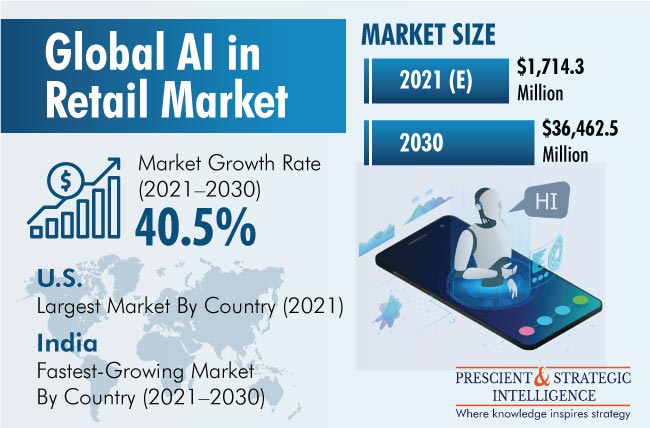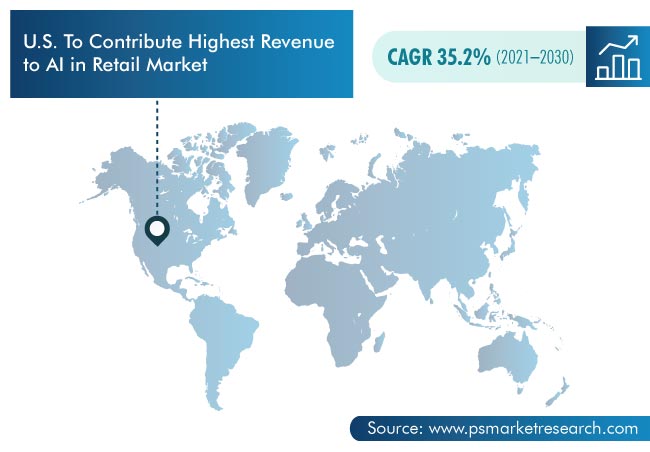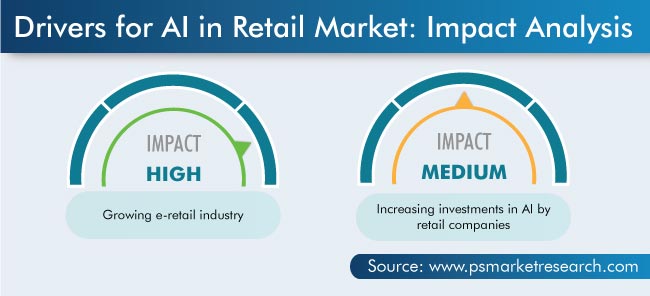Report Code: 10832 | Available Format: PDF | Pages: 154
- Home
- ICT and Media
- AI in Retail Market
Artificial Intelligence (AI) in Retail Market Research Report: By Offering (Solution, Service), Technology (Machine Learning, Natural Language Processing, Computer Vision) - Global Industry Analysis and Growth Forecast to 2030
- Report Code: 10832
- Available Format: PDF
- Pages: 154
- Report Description
- Table of Contents
- Market Segmentation
- Request Free Sample
Market Overview
The global AI in retail market is estimated to generate $1,714.3 million revenue in 2021, and it is expected to witness a CAGR of 40.5% during 2021–2030. The growing online retail sales, escalating focus of retailers on enhancing customers’ shopping experience, increasing dependence on digital marketing, and surging investments in AI, complemented by supportive government policies, are the key factors contributing to the growth of the industry globally.
The financial services sector evolved and transformed digital business models, and the adoption of these new business models has positively affected the market during the COVID-19 pandemic. The total shutdown of most brick-and-mortar retail outlets led to a strong dependence on online tools, such as AI-based personal shoppers and chatbots, during the pandemic. Many telecommunications and media giants had factored AI and analytics into their marketing and sales strategies in the past, and this trend grew further in 2020. Retailers expect that in the coming years, AI will have a major impact on customer intelligence, inventory management, and chatbots.

Solution Category Dominated Market
The solution category is estimated to account for the larger global market share in 2021, on the basis of offering. This was because of the high adoption of AI-based retail solutions in developed economies, such as the U.S., Canada, Germany, and Japan, to provide a better shopping experience to customers.
Natural Language Processing (NLP) To Witness Highest Growth Rate
The NLP category is projected to witness the fastest growth in the AI in retail market during the forecast period (2022–2030), based on technology. This is because NLP enables computers to understand and process human language. This allows retailers to understand the shopping preferences of customers in a better way, which further helps them in offering more-personalized services.
Asia-Pacific (APAC) To Witness Fastest Growth in Coming Years
During the historical period (2015–2021), North America held the largest market share due to the growing e-commerce industry and rising dependence of companies on digital marketing in the U.S. and Canada. The high internet and smartphone penetration and the greater convenience associated with online shopping have led to the growth of the e-commerce industry in the region, which has contributed to the advance of its market.
On the other hand, the APAC market is expected to witness the fastest growth during the forecast period, mainly on account of the rapid adoption of the machine learning technology by online retailers in the region, particularly China. With e-commerce companies, such as Alibaba Group Holding Limited, Amazon.com Inc., and JD.com Inc., witnessing rising rales, AI-driven recommendation engines, price optimization solutions, and supply chain management (SCM) solutions are increasingly being adopted for enhancing the shopping experience of customers.

Usage of AI For Multi-Channel Marketing Is Key Industry Trend
The usage of the AI technology among retailers for multi-channel marketing can be viewed as a key trend. The large volume of data generated on in-store consumer behavior, e-mail marketing, and campaign management, when analyzed, helps identify consumption patterns and develop personalized campaigns, thus facilitating better decision making. Since AI supports these functions and can further be utilized for automating repetitive tasks, including data entry and product labeling, its far-expanding application in multi-channel marketing will help create an intelligent blueprint of the data collected through digital platforms as well as brick-and-mortar stores.

Growing E-Retail Industry and Increasing Investments in AI by Retail Companies Boosting Market Size
The expansion of the e-retail industry is a major factor driving the growth of the market for AI in retail solutions globally. This growth in e-retailing can be mainly ascribed to the rising internet penetration, surging smartphone adoption, increasing usage of alternate payment methods, and rising investments in logistics across the globe. The retail market is rapidly evolving, more so because the incorporation of AI in operations allows retailers to predict consumer behavior and offer personalized services, thus enhancing customer experience and satisfaction.
The increasing investments in AI by retail companies can be viewed as another major factor fueling the growth of the market. The U.K., France, China, and the U.S. are demonstrating the highest penetration of AI in the retail industry, which is also indicative of the high investments made by various firms in AI. For instance, in April 2020, IKEA acquired Geomagical Labs, an AI and augmented reality (AR) startup. Geomagical Labs combines the computer vision, machine learning, and AR technologies in a mobile application that allows customers to visualize and intuitively design their living spaces from their own homes.
| Report Attribute | Details |
Historical Years |
2015-2021 |
Forecast Years |
2022-2030 |
Base Year (2021) Market Size |
$1,714.3 million |
Market Size Forecast in 2030 |
$36,462.5 Million |
Forecast Period CAGR |
40.5% |
Report Coverage |
Market Trends, Drivers, and Restraints; Revenue Estimation and Forecast; Segmentation Analysis; Impact of COVID-19; Companies’ Strategic Developments; Company Profiling |
Market Size by Segments |
By Offering; By Technology; By Region |
Market Size of Geographies |
U.S., Canada, Germany, France, Italy, U.K., Russia, Japan, China, India, Australia, South Korea, Brazil, Mexico, Saudi Arabia, South Africa, U.A.E., Turkey |
Explore more about this report - Request free sample
Market Players Involved in Partnerships and Acquisitions to Gain Competitive Edge
The AI in retail market is highly competitive due to the presence of several key players. In recent years, many of them have been involved in partnerships and acquisitions in order to stay ahead of their competitors. For instance,
- In October 2021, Accenture PLC entered into an agreement to acquire BRIDGEi2i, an AI and analytics firm headquartered in India, with additional offices in the U.S. and Australia. The acquisition will add more than 800 deeply skilled professionals to Accenture’s Applied Intelligence practice, strengthening and increasing its global capabilities in data science, machine learning, and AI-powered insights.
- In April 2021, Accenture PLC and Sumitomo Chemical established a joint venture, SUMIKA DX ACCENT, which leverages AI, data analytics, and other technologies to transform operations and develop new businesses at Sumitomo Chemical Group. It is 80% owned by Sumitomo Chemical and 20% by Accenture. Using Accenture’s industry and digital transformation experience, the joint venture is expected to optimize Sumitomo’s supply chain and promote intelligent automation in its operations, using AI, data analytics, and robotic process automation (RPA).
Key Players in Global AI in Retail Industry Are
- International Business Machines Corporation
- Microsoft Corporation
- Google LLC
- Salesforce.com Inc.
- Oracle Corporation
- SAP SE
- Accenture PLC
- Infosys Limited
- Intel Corporation
- Amazon.com Inc.
- ViSenze Pte. Ltd.
- Evolv Technology Solutions Inc.
Market Size Breakdown by Segments
The artificial intelligence in retail market report offers comprehensive market segmentation analysis along with market estimation for the period 2015-2030.
Based on Offering
- Solution
- Chatbot
- Customer relationship management (CRM)
- Price optimization
- Recommendation engine
- Supply chain management (SCM)
- Visual search
- Service
- Professional
- Managed
Based on Technology
- Machine Learning
- Natural Language Processing (NLP)
- Computer Vision
Geographical Analysis
- North America
- U.S.
- Canada
- Europe
- Germany
- U.K.
- France
- Russia
- Italy
- Asia-Pacific (APAC)
- China
- Japan
- India
- South Korea
- Australia
- Latin America (LATAM)
- Brazil
- Mexico
- Middle East and Africa (MEA)
- Saudi Arabia
- U.A.E.
- Turkey
- South Africa
The 2030 value of the market for AI in retail solutions will be $36,462.5 million.
Based on technology, machine learning contributes the highest AI in retail industry revenue.
The market for AI in retail solutions will witness the fastest growth in APAC.
The use of AI in multi-channel marketing is the biggest trend in the AI in retail industry.
Companies in the market for AI in retail solutions are engaging in acquisitions and partnerships.
Get a bespoke market intelligence solution
- Buy report sections that meet your requirements
- Get the report customized as per your needs

Want a report tailored exactly to your business strategy?
Request CustomizationWant an insight-rich discussion with the report author?
Speak to AnalystOur dedication to providing the most-accurate market information has earned us verification by Dun & Bradstreet (D&B). We strive for quality checking of the highest level to enable data-driven decision making for you
Our insights into the minutest levels of the markets, including the latest trends and competitive landscape, give you all the answers you need to take your business to new heights
With 24/7 research support, we ensure that the wheels of your business never stop turning. Don’t let time stand in your way. Get all your queries answered with a simple phone call or email, as and when required
We take a cautious approach to protecting your personal and confidential information. Trust is the strongest bond that connects us and our clients, and trust we build by complying with all international and domestic data protection and privacy laws